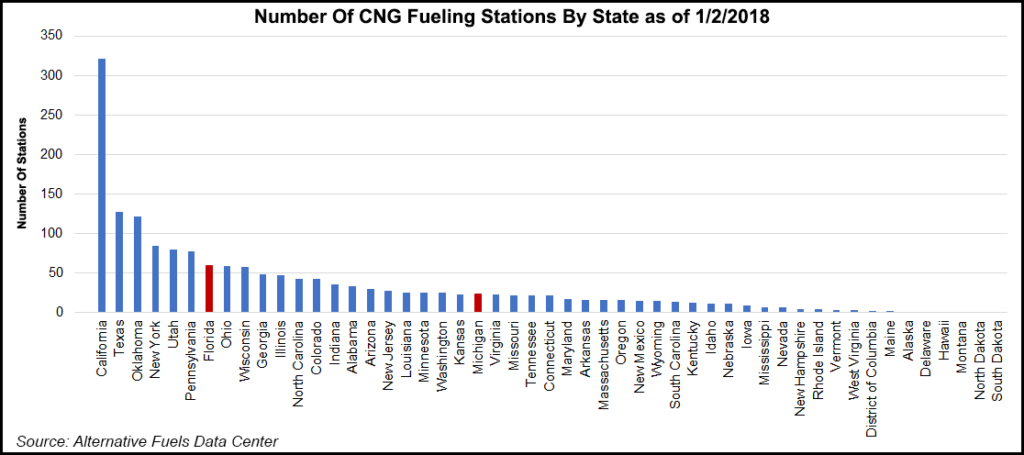NGI All News Access | Infrastructure
Florida Port Offers Permanent Docking for CNG Fueling Station
The oversight board for the Port of Tampa Bay, Florida’s largest, has approved a project and 20-year lease with locally based Integral Energy to develop a compressed natural gas (CNG) fueling station for commercial and passenger vehicles.

The port’s Board of Commissioners unanimously approved the deal to begin construction on a CNG fueling facility at a 5.7-acre site. Integral initially is to make the unimproved property construction ready for the facility that would include retail space. Commissioners approved a first year lease of $142,500 with subsequent annual rent of $265,000.
Port CEO Paul Anderson said the CNG fueling stop would support thousands of trucks and a growing number of service providers operating daily. The new station is to offer four CNG pumps to service long-haul trucking as well as surface parking for passenger car drivers wanting to refuel.
“This station will allow fleet vehicles to reliably and safely begin to shift to CNG,” said Integral’s AnddrikkFrazier, managing partner. The initial terms of Integral’s 20-year lease kick in April 1.
In Michigan, the Flint Mass Transportation Authority (MTA) has signed an agreement with local utility Consumers Energy to build and operate a public/private CNG fueling station to serve the MTA transit fleet. For the combination utility the project qualifies as an environmental mitigation effort as mandated in 2014 by the U.S. Environmental Protection Agency and the U.S. Department of Justice.
Built onsite at MTA’s existing alternative fuel facility, the station is to operate on a 24/7 basis for the general public and the transit system’. MTA plans to add 50 natural gas vehicles (NGV) to its fleet during the next 20 months.
MTA CEO Ed Benning said the agreement helps the transportation system advance its alternative fuels program “while benefiting area businesses and the public.” MTA operates other alternative fuel buses and plans to eliminate all diesel vehicles in its fleet. The transit authority is approaching 80% alternative fuel vehicles in its fleet, he said.
In Mexico, a recent study by the Monterrey Institute of Technology (Tec) and Risk Counseling Associates underscores the advantages of NGVs for replacing fuel in public and private fleets. The study was found to confirm the price and environmental advantages of natural gas as a transportation fuel relative to diesel.
Driven by local metropolitan air pollution issues in recent months, the study said the initial higher cost of switching to CNG is outweighed by the public health and environmental benefits. The Tec study’s view on a global basis is that the Pacific-Asian region is doing the best job of adopting natural gas as a transportation fuel. The study also pointed out that in Bolivia more than 50% of public transport vehicles use natural gas.
© 2024 Natural Gas Intelligence. All rights reserved.
ISSN © 1532-1231 | ISSN © 2577-9877 |
